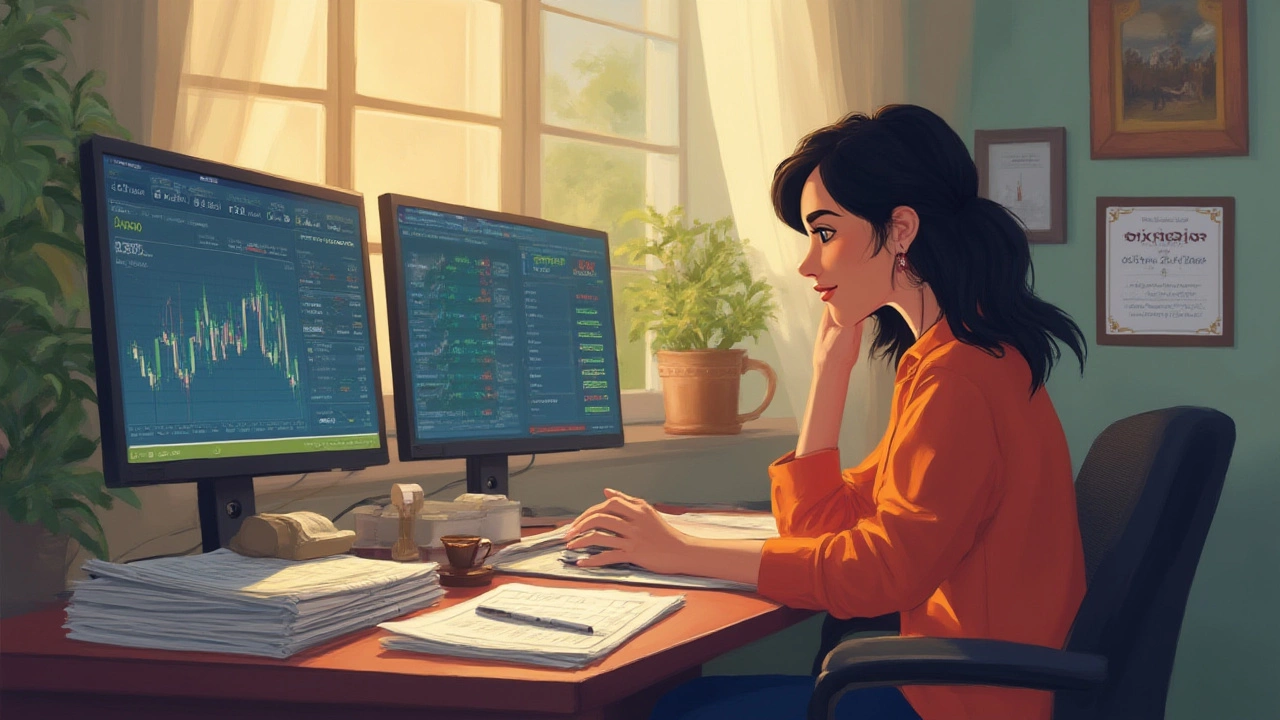
If you ask ten different traders how they got their start, you’ll hear ten wildly different stories. It’s not a field that picks you up, hands you a script, and says “just follow this path.” Some folks start off crunching numbers at top universities, others bail on college after a semester of philosophy and end up beating Wall Street at its own game. There’s no secret handshake. No one-size-fits-all diploma hanging above the desk. So why do so many newcomers stress over “the right degree” for trading? Maybe it’s the image of the slick finance grad in a suit, barking orders on the exchange floor. Or maybe it’s just the millions riding on each trade. But here’s where it gets interesting: the reality about traders’ degrees isn’t what you’d expect.
What Do Most Traders Actually Study?
Walk into any top bank’s trading floor or peek inside a lively prop trading firm, and you’ll see a mixed crowd—sure, lots of business and finance suits, but also folks who once obsessed over quantum mechanics, computer code, or even art history. That’s not a joke. Take Citadel Securities, whose trading teams are famously stacked with math Olympiad veterans, computer scientists, and engineers. The 2023 eFinancialCareers survey put things into perspective: among 2,000 professional traders, 42% had a degree in finance or economics, 37% in STEM (Science, Technology, Engineering, Math), and only 14% in business administration. Some even claimed degrees in totally unrelated subjects—one guy in London made the jump from marine biology to FX trading because he liked probability puzzles.
But let’s get down to brass tacks. Why are math and STEM majors dominating more than pure business grads? Simple: today’s markets live and breathe data. Algorithms don’t care how slick your sales pitch is or what college club you ran; they want you to understand volatility, risk, and patterns in the numbers. Traders with statistics and engineering backgrounds handle quantitative roles, building models or spotting tiny irregularities before anyone else. They’re comfortable juggling massive data sets, writing Python scripts, and poking holes in market theories over lunch.
But not every trading job looks like that. Floor traders and market makers still need killer intuition, people skills, and the nerve to act when prices go wild. For them, economics, business, or even psychology degrees often come in handy. Understanding how a crowd moves, why fear spikes selling, or how politics shakes oil prices—that stuff matters. Surveys from trading desks in the U.S. show finance, business, and economics still make up the largest single group, but they’re not the only path.
If you’re eyeing hedge funds, buckle up: they love raw talent and intellectual curiosity more than a generic diploma. Some, like Renaissance Technologies, are notorious for hiring scientists and mathematicians who have little finance experience. A 2022 Financial Times piece even found that among new entry-level quant traders, roughly 60% held a master's or PhD in math-heavy subjects—think applied math, statistics, or computer science—while only a minority had specialized in finance. So if you geek out over numbers or coding, you’re in great company.
To keep it all straight, here’s a quick look at a 2024 survey of trader degrees at top global investment banks:
| Degree Major | % of Bank Traders |
|---|---|
| Finance/Economics | 39% |
| Engineering (all fields) | 21% |
| Math/Statistics | 17% |
| Business Administration | 11% |
| Computer Science | 7% |
| Other (Psychology, History, English, etc.) | 5% |
These numbers are shifting every year. Technology’s role in trading grows, so does the appetite for quants, coders, and anyone who can wrangle data in real time. But traditional degrees haven’t vanished. The best traders? They blend book smarts with guts, creativity, and plenty of hands-on learning.

Does Your Degree Really Matter? Myths, Stats, and Unexpected Facts
It’s easy to fixate on the idea that a specific degree will open every door in trading. Plenty of guides list “finance” or “business” and stop there, but that trickles down from tradition, not hard rules. Here’s what the real world looks like now: banks and trading firms are hungry for a mix of minds—analytical thinkers, networkers, hustle-driven people who don’t freeze when the market swings. A recent LinkedIn analysis (April 2024) checked the profiles of more than 15,000 active traders in the US and UK. The surprise? 31% didn’t study finance or business. Psychology, engineering, physics, even philosophy made the list. Even more telling: 23% had a degree unrelated to math or markets. Their edge? Knowing how to learn fast and handle chaos.
Don’t just take my word for it. The London Metal Exchange in 2023 ran a mentorship program for aspiring traders from underrepresented backgrounds. Out of the ten who got full-time jobs, only three came from business or finance. One had studied mechanical engineering. Another majored in classical literature but ran a successful online trading group on the side. The head of the LME trading desk put it bluntly: what matters most is “proof you can think critically, keep calm in pressure, and adapt.”
The highest-paid traders on Wall Street aren’t always the ones with sparkling GPAs or Ivy League MBAs. In fact, Bloomberg’s 2022 feature story uncovered that most prop trading firm founders actually dropped out of college (or never studied finance formally), instead learning by risking their own cash, trading on online platforms, and getting obsessed with price action.
But let’s not ignore the other side. If you aim for entry-level jobs in big banks or prestigious hedge funds, especially in New York or London, recruiters still use degrees as a filter. In those settings, finance, math, statistics, and business degrees punch your ticket to an interview, if not always to a job offer. Employers look for:
- Quantitative skills (numbers, algorithms, or coding—think calculus, probability, statistics)
- Critical thinking and fast decision-making (what to do when the price charts flash red)
- Communication chops (explaining trades, pitching ideas, team banter)
- Real market experience (internships, trading contests, running a demo account)
But plenty of traders switch in later, sometimes after years in a different field. The digital revolution has made it easier for self-taught traders to prove themselves. Platforms like Interactive Brokers, Robinhood, and even FTX (before its implosion) have let thousands test strategies with real money before ever getting a finance degree. In 2023, the Wall Street Journal highlighted a new breed of “alt traders”—teachers, nurses, and software devs—blending their real-world smarts with trading know-how. And they’re making money.
One more myth killer: if you’re planning to build automated trading systems (algo trading), the best degree is rarely pure finance; instead, computer science, physics, or engineering dominate. In coding-heavy shops, you’ll find more Python than price charts. And if you want to manage risk or work as an options trader, a solid handle on high-level math matters way more than being a business major. A 2023 report by Glassdoor listed the following as the most common skills in trader job listings:
- Python/R programming
- Advanced Excel/data analysis
- Knowledge of financial markets (yes, but not always from a classroom)
- Presentation and persuasion skills
- Stress management/psychology basics
So, does your degree matter? Yes, but less than people think. Raw curiosity, risk-taking, and relentless practice make bigger waves than the official name on your diploma. Even the top funds admit they’ll take a chess prodigy or physics PhD over someone who mailed in business school assignments—if that candidate can handle real money and think on their feet.

Skills, Tips, and Alternative Paths: Getting Into Trading Without the “Perfect” Degree
Let’s face it: not everyone lives inside an Ivy League handbook. If you’re reading this and didn’t study finance, you’re not out of the game—you might just play it differently. Here’s how regular folks, with all kinds of backgrounds, break into professional trading—and what actually matters after graduation.
The hottest tip? Build market knowledge on your own. Demo accounts at brokers like TD Ameritrade or eToro let you trade real-time with fake money. Skills challenge: try to grow your demo balance consistently for three consecutive months. You’ll learn more battling live market volatility than in a classroom, and this record looks killer on a resume. Many top firms now ask for “trading journals”—logs of every trade, mistake, and decision. Start one now, and when recruiters ask about your skills, show your results, not just your degree.
If your degree is in an unrelated field—say, biology or design—it pays to take some short courses to fill in gaps. Online options like Coursera, Udemy, and even free YouTube series teach you the basics of financial markets, technical analysis, chart reading, and risk management. Certificate courses in Excel, Python, or statistics stand out on your CV. Actual trading isn’t step-by-step, but stacking small skills builds serious credibility.
For students, internships are golden. Whether you’re at a big bank or a local brokerage, real-world experience beats any textbook. Join trading or investing clubs (yes, even online ones). Competitions like Rotman International Trading Competition or CME Trading Challenge put your skills to the test—and winners frequently get job offers from sponsors.
Pro tip for STEM and coding folks: consider “quant” jobs. Quantitative analysts design systems to predict market moves, manage risk, and build trading signals. Most quant shops care more about your coding tests, math puzzles, and logic than your GPA in finance. Even blockchains and crypto trading now hire coders, physicists, and engineers without finance degrees if you can show results.
Already working a different job? Plenty of traders pick up the ropes part-time, swinging trades before or after work and building up real portfolios. The 2024 Boomberg survey found that almost half of new retail traders had started as something else—software developers, school teachers, even military officers. They networked like crazy, attended trading meetups, and joined online communities (like r/Daytrading or FinTwit) for up-to-the-minute ideas and support. Your personal network—people who share trade tips or success stories—often matters more than a recruiter’s checklist.
Here are some concrete next steps if you want to trade, regardless of your background:
- Self-educate: Read classic books like "Reminiscences of a Stock Operator" or "Market Wizards" to get the psychology, not just theory.
- Practice: Trade a simulated account till you can stay profitable in real time at least three months.
- Learn to code: Basic Python opens doors to algorithmic trading and data analysis, even if you’re a total beginner.
- Boost your Excel and math: Quick calculations mean quick decisions—practice every week.
- Join communities: Not just LinkedIn—real Discord servers, trading Slack groups, or local meetups.
- Keep a journal: Document every trade—good, bad, or ugly. Review every month.
- Reach out: Find traders on Twitter/LinkedIn and ask questions. You’d be surprised how willing people are to explain their path.
Key fact: Recruiters now care most about proof of skill and resilience. Do you bounce back from mistakes? Can you adapt? Are your market instincts sharp? That’s what separates career traders from the noisemakers, no matter the degree on your wall. If you’re working towards a finance or business degree, double up on practical projects and data analytics. If you’re from physics or computer science, lean into your coding and problem-solving strengths. If your degree is outside these buckets, build skills on the side and prove you’ve got what it takes.
The trading world changes fast. The best don’t just follow the crowd or chase hot degrees—they study market chaos, thrive on new information, and grab every chance to get real, practical experience. That’s the edge you want.
